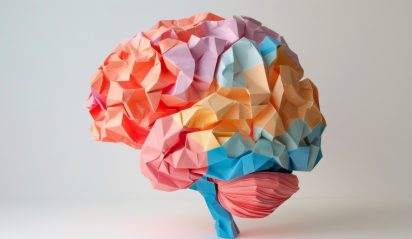Eating disorders are serious mental health conditions that reach far beyond food and weight. They deeply affect the body and mind, including the health and function of the brain itself. Understanding the effects of these illnesses on the brain crucial — not to create fear or shame, but to highlight why early treatment and ongoing support are so important for healing.
Eating Disorders + Brain Function
Eating disorders often persist even when individuals know they’re harmful; that’s because these illnesses are not choices but complex mental health conditions deeply rooted in biology, psychology, and environment. Starvation can change brain chemistry, reinforcing obsessive thoughts about food and weight. Bingeing and purging can temporarily soothe overwhelming emotions or stress. Fear of change, perfectionism, shame, or trauma can all fuel the cycle, making it feel safer to stay in the grip of the illness rather than face the uncertainty of recovery.
This is why eating disorders require compassionate, specialized treatment, not just willpower, to break free and heal.
How Starvation and Malnutrition Affect the Brain
The brain needs a steady supply of nutrients to work properly. When the body is starved, as in anorexia nervosa, or caught in cycles of bingeing and purging, as in bulimia nervosa, it disrupts the delicate balance the brain relies on to function.
Research shows that prolonged undernourishment can lead to actual changes in brain structure and connectivity. Studies using MRI scans have found that people with anorexia often have reduced gray matter, the parts of the brain responsible for thinking, decision-making, and self-control. White matter, which helps different regions of the brain communicate, can also be damaged.
A study published in Biological Psychiatry (2016) revealed that individuals with anorexia nervosa showed significant brain volume loss. This is partly due to dehydration and partly because the body breaks down tissue, including brain tissue, to survive prolonged starvation.
How ARFID Affects the Brain
Avoidant/restrictive food intake disorder (ARFID) can affect the brain by limiting essential nutrients needed for concentration, memory, and decision-making. Nutrient shortages impact brain health and communication between cells.
ARFID also increases anxiety around eating, activating brain areas linked to fear and reward, which can make mealtimes stressful and affect mood and flexibility. This can make trying new foods harder. With compassionate care, proper nutrition, and personalized therapy, the brain can recover, helping individuals regain mental, emotional, and physical strength. Recovery is possible, and every step forward matters.
How Binge Eating Disorder Affects the Brain
Like anorexia, bulimia, and ARFID, binge eating disorder (BED) can deeply impact the brain’s ability to function. During binge episodes, the brain’s reward system—especially areas linked to pleasure and motivation—can become overactivated, making it harder to regulate urges around food. This can lead to cycles of intense cravings and feelings of loss of control.
Over time, these patterns may affect brain regions involved in decision-making, impulse control, and emotional regulation, making it harder to manage stress and emotions.
It’s important to know that these changes don’t reflect weakness or failure. With compassionate support, evidence-based therapy, and self-care, the brain can relearn healthier patterns.
Cognitive and Emotional Consequences
Eating disorders don’t just change the brain’s structure; they also affect how it works day to day. Malnutrition can impair concentration, memory, and decision-making. Many people with eating disorders describe feeling “foggy” or having trouble focusing on tasks that once felt easy.
The brain’s neurotransmitters, like serotonin and dopamine, are also affected. These chemicals help regulate mood and reward pathways. When eating habits are extreme or chaotic, these pathways can become dysregulated, worsening anxiety, depression, and obsessive thoughts about food and weight.
One review published in Neuroscience & Biobehavioral Reviews (2020) showed that disordered eating patterns are strongly linked to changes in how the brain processes reward and punishment, making recovery even more challenging, but also underscoring the biological nature of these conditions.
The Good News: Recovery Can Heal the Brain
Despite how serious these effects can be, there is hopeful news: eating disorder-related damage to the brain can be reversed. Studies show that with weight restoration, balanced nutrition, and specialized treatment, the brain can regain lost volume and function.
In one landmark study published in The American Journal of Psychiatry (2018), researchers found that adolescents with anorexia who received intensive treatment showed significant brain volume recovery after just a few months of sustained weight restoration. White matter and gray matter both improved as the body returned to a healthier state.
This shows that early and effective treatment doesn’t just help the body recover; it literally helps the brain repair itself. Cognitive function, memory, and emotional regulation can all improve, giving people the clarity and mental energy needed to continue healing.
Why specialized treatment matters
Eating disorders often coexist with other mental health conditions like depression, anxiety, or ADHD. Because of this, treatment must address not just food and weight but also the underlying emotional and cognitive patterns that fuel disordered eating.
A comprehensive approach may include:
Medical stabilization: Ensuring the body and brain are nourished safely.
Nutritional counseling: Helping restore balanced eating patterns.
Psychotherapy: Cognitive-behavioral therapy (CBT) and other evidence-based methods help address disordered thoughts and behaviors.
Medication management: For co-occurring mood or anxiety disorders when appropriate.
Family or group support: Encouraging understanding and accountability.
Each of these supports the brain’s healing process by restoring the nutrients and emotional safety it needs to function at its best.
Hope for the Future
It’s never too late to get help. Even for those who have struggled for many years, the brain remains remarkably resilient. With compassionate, evidence-based care, people with eating disorders can heal their brains, rebuild healthy thinking patterns, and reclaim the energy to live a fuller, more connected life.
Magnolia Creek is dually licensed to treat eating disorders and a multitude of co-occurring disorders. We tailor our treatment plans to individual needs and goals while empowering every client in our care to embrace recovery with resilience and independence.
Sources
King, J.A., et al. Structural Brain Abnormalities in Anorexia. Biol Psychiatry. 2016;79(9): 732–739.
Seitz, J., et al. Brain Volume Recovery in Adolescents with Anorexia. Am J Psychiatry. 2018;175(5): 484–491.
Steward, T., et al. Neural Plasticity and Eating Disorders. Neurosci Biobehav Rev. 2020;112: 400–409.














































